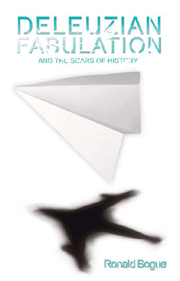Book contents
- Frontmatter
- Contents
- Acknowledgements
- Introduction
- 1 The Concept of Fabulation
- 2 Becoming-Prophet: Zakes Mda's The Heart of Redness
- 3 Becoming-Child, Becoming-Untouchable: Arundhati Roy's The God of Small Things
- 4 Becoming-Memory: Roberto Bolaño's Amulet
- 5 Becoming-Woman, Becoming-Girl: Assia Djebar's So Vast the Prison
- 6 Becoming-Fish: Richard Flanagan's Gould's Book of Fish
- Conclusion
- Bibliography
- Index
- Miscellaneous Endmatter
4 - Becoming-Memory: Roberto Bolaño's Amulet
Published online by Cambridge University Press: 12 September 2012
- Frontmatter
- Contents
- Acknowledgements
- Introduction
- 1 The Concept of Fabulation
- 2 Becoming-Prophet: Zakes Mda's The Heart of Redness
- 3 Becoming-Child, Becoming-Untouchable: Arundhati Roy's The God of Small Things
- 4 Becoming-Memory: Roberto Bolaño's Amulet
- 5 Becoming-Woman, Becoming-Girl: Assia Djebar's So Vast the Prison
- 6 Becoming-Fish: Richard Flanagan's Gould's Book of Fish
- Conclusion
- Bibliography
- Index
- Miscellaneous Endmatter
Summary
With the publication of The Savage Detectives in 1998, Roberto Bolaño rose to prominence as one of Latin America's leading writers. That status was confirmed the next year when he received Latin America's highest literary honour, the Rómulo Gallegos Prize. By the time of his death in 2003 at the age of fifty, Bolaño had produced ten novels and three short story collections, including the posthumously published, sprawling thousand-page masterpiece 2666. Between his two massive narratives, The Savage Detectives and 2666, Bolaño crafted a brilliant short novel, Amulet (1999), that exemplifies in miniature the art of fabulation as he practised it in all his fiction.
Auxilio's Memory Space
Amulet is the first-person narration of Auxilio Lacouture, an illegal Uruguayan immigrant in Mexico City who hides in the women's bathroom of the Faculty of Philosophy and Literature Building at UNAM (Universidad Nacional Autónoma de México, National Autonomous University of Mexico) from 18 to 30 September 1968, during the army occupation of the campus. In the course of that ordeal, she undergoes a decided process of becoming-other. Her story, she announces at the novel's outset, ‘is going to be a horror story. A story of murder, detection and horror … it's the story of a terrible crime’ (‘Ésta será una historia de terror. Será una historia policiaca, un relato de serie negra y de terror.… es la historia de un crimen atroz’) (Bolaño 2006: 1/1999: 11).
- Type
- Chapter
- Information
- Deleuzian Fabulation and the Scars of History , pp. 108 - 131Publisher: Edinburgh University PressPrint publication year: 2010



